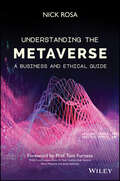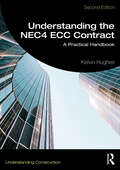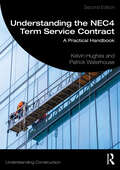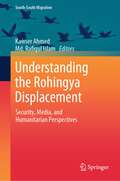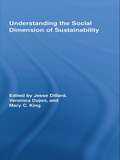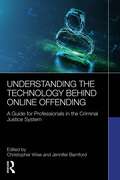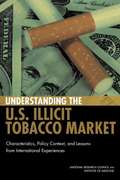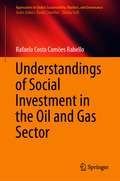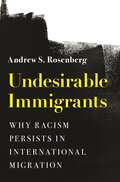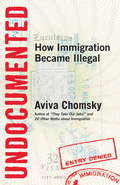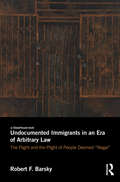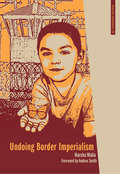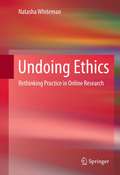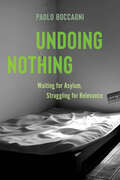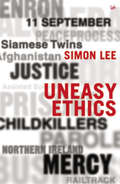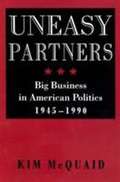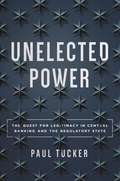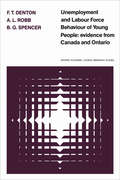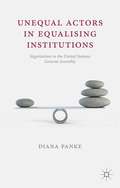- Table View
- List View
Understanding the Lean Enterprise
by Andrea Chiarini Pauline Found Nicholas RichThis publication is in collaboration with the University of Buckingham and is the result of a combined research and review process carried out by the three Editors who belongs to the University of Ferrara, Italy, the University of Buckingham, UK and Swansea University, UK. The book deepens the debate about the lean enterprise from both an academic and a professional management perspective. It thus provides the reader with a sound understanding of the modern lean enterprise and its current evolution. A range of innovative topics are covered, with individual chapters addressing the combinations of lean with hoshin kanri, green management, IT, organizational learning, flow accounting, system thinking, problem solving, internationalization aspects, luxury industry, and product innovation. Since the term "lean" first entered contemporary operations management language in 1990 to describe a set of practices proven to deliver superior performance over mass production systems, the lean approach to waste reduction and value generation has moved from vehicle production to other manufacturing sectors. It has reshaped the support functions of manufacturing businesses and has evolved from private industry into the public sector. Lean thinking is now a dominant model of operations management and has brought with it a new language and toolbox.
Understanding the Metaverse: A Business and Ethical Guide
by Nicola RosaAn expansive discussion of the mechanics, framework, and implications of the metaverse In Understanding the Metaverse: A Business and Ethical Guide, expert product and customer experience strategist Nick Rosa delivers a timely exploration of what is bound to be one of the most important technologies of our time. The author explains the technology that underpins the metaverse as it exists today and that will form the basis for its rapid evolution in the future. He also describes the commercial, ethical, and sociological implications of this technology, showing you the threats and opportunities that individuals and businesses are likely to encounter as they approach the metaverse for the first time. In the book, you'll discover: How the technology is shaping the human evolution and society How game mechanics and experience design are key to unlock the full potential of the Metaverse unlocking a new frontier for social interaction How Blockchain, digital currencies, and tokenomics are opening a new financial landscape for brands, creators and communities How Artificial intelligence and deep learning will shape the way businesses will conduct commerce in the Metaverse The ethical implications of designing highly emotionally impactful immersive experiences The potential dangers derived by the misuse of biometric and personal data to exploit consumer behaviour and for mass manipulation A thoroughly insightful discussion of a fascinating intersection of technology and humanity, Understanding the Metaverse belongs on the bookshelves of business leaders, technology enthusiasts, marketers, entrepreneurs, and anyone else with an interest in the next frontier of human achievement.
Understanding the Modern Russian Police
by Olga B. Semukhina Kenneth Michael ReynoldsUnderstanding the Modern Russian Police represents the culmination of ten years of research and an ongoing partnership between the Volgograd Academy of Russian Internal Affairs Ministry (VA MVD) and the Volgograd branch of the Russian Presidential Academy of National Economy and Public Administration (VAPA). The book provides a timely and comprehen
Understanding the NEC4 ECC Contract: A Practical Handbook (Understanding Construction)
by Kelvin HughesAs usage of the NEC family of contracts continues to grow worldwide, so does the importance of understanding its clauses and nuances to everyone working in the built environment. This second edition of Understanding the NEC4 ECC Contract uses plain English to lead the reader through the NEC4 Engineering and Construction Contract’s key features. Chapters cover: Contractor’s main responsibilities The use of early warnings Contractor’s design Tendering Quality management Payment Liabilities and insurance Termination Avoiding and resolving disputes and much more.Common problems experienced when using the Engineering and Construction Contract (ECC) are signalled to the reader throughout, and the correct way of reading each clause explained. The way the contract effects procurement processes, dispute resolution, project management and risk management are all addressed in order to direct the user to best practice. This second edition takes into account the updates to the contract released in 2019, 2020 and 2023, and brings the book up to date with the most current practice.Written for construction professionals, by a practicing international construction contract consultant, this handbook is the most straightforward, balanced and practical guide to the NEC4 ECC available. An ideal companion for employers, contractors, project managers, supervisors, engineers, architects, quantity surveyors, subcontractors and anyone else interested in working successfully with the NEC4 ECC.
Understanding the NEC4 ECC Contract: A Practical Handbook (Understanding Construction)
by Kelvin HughesAs usage of the NEC family of contracts continues to grow worldwide, so does the importance of understanding its clauses and nuances to everyone working in the built environment. This second edition of Understanding the NEC4 ECC Contract uses plain English to lead the reader through the NEC4 Engineering and Construction Contract’s key features. Chapters cover: Contractor’s main responsibilities The use of early warnings Contractor’s design Quality management Payment Liabilities and insurance Termination Avoiding and resolving disputes Tendering Common problems experienced when using the Engineering and Construction Contract (ECC) are signalled to the reader throughout, and the correct way of reading each clause explained. The way the contract effects procurement processes, dispute resolution, project management and risk management are all addressed in order to direct the user to best practice. This second edition takes into account the updates to the contract released in 2019, 2020 and 2023, and brings the book up to date with the most current practice.Written for construction professionals, by a practising international construction contract consultant, this handbook is the most straightforward, balanced and practical guide to the NEC4 ECC available. An ideal companion for employers, contractors, project managers, supervisors, engineers, architects, quantity surveyors, subcontractors and anyone else interested in working successfully with the NEC4 ECC.
Understanding the NEC4 Professional Service Contract: A Practical Handbook (Understanding Construction)
by Kelvin HughesAs usage of the NEC (formerly the New Engineering Contract) family of contracts continues to grow worldwide, so does the importance of understanding its clauses and nuances to everyone working in the built environment. Currently in its fourth edition (NEC4), this set of contracts is different to others in concept as well as format, so users may well find themselves needing a helping hand along the way. Understanding the NEC4 Professional Service Contract uses plain English to lead the reader through the NEC4 Professional Service Contract’s key features and differences from its predecessor, the NEC3 Professional Services Contract, including: Main and Secondary Options the use of early warnings programme provisions payment compensation events preparing tender documents Common problems experienced when using the Professional Service Contract are signalled to the reader throughout, and the correct way of interpreting each clause explained. The way the contract affects procurement processes, dispute resolution, project management and risk management are all addressed in order to direct the user to best practice. Written for construction professionals, by a practising international construction contract consultant, this handbook is the most straightforward, balanced and practical guide to the NEC4 Professional Service Contract available. It is an ideal companion for Clients, Contractors, Service Managers, Project Managers, Supervisors, Engineers, Architects, Quantity Surveyors, Subcontractors and anyone else interested in working successfully with the NEC4 Professional Service Contract.
Understanding the NEC4 Term Service Contract: A Practical Handbook (Understanding Construction)
by Kelvin Hughes Patrick WaterhouseUse of the NEC4 suite of contracts continues to grow and the new edition of Understanding the NEC4 Term Service Contract includes significant additional materials and changes since its original publication immediately after the initial release of the NEC4 contracts. Experienced authors and construction contracts specialists Kelvin Hughes and Patrick Waterhouse have added numerous practical experiences, case studies, lessons learned and guidance notes which were not available at the time of writing the original book.Covering all the recent updates to the contract and written in plain English, Understanding the NEC4 Term Service Contract offers a practical guide to the use and management of the NEC4 Term Service Contract (TSC). The authors describe the full life of a contract, from the initial selection of options and contract formation through to the operations period and ultimately termination and dispute resolution. Although born of the same stable as the NEC4 construction contracts, the TSC is aimed at maintaining infrastructure and differs significantly from its siblings.This is essential reading for anyone working with the contracts and takes the reader through the important provisions including communications, planning, early warnings, compensation events and payments. It is ideal for clients, contractors and their advisors describing how to deploy the contract successfully.
Understanding the Rohingya Displacement: Security, Media, and Humanitarian Perspectives (International Perspectives on Migration)
by Kawser Ahmed Md. Rafiqul IslamThis book provides a focused and comprehensive understanding of the conflict surrounding the Rohingya displacement, using a unique peace and conflict transformation viewpoint. Divided into four sections and nineteen chapters, it covers significant themes related to the conflict. It provides an in-depth examination of its security implications, media impact, and the need for a long-term transformation strategy. The authors offer a sharp perspective on the crisis, covering a wide range of topics, including human rights abuses, geopolitics, media influence, and repatriation of the Rohingya. Each chapter focuses on a different aspect of the conflict, providing readers with a thorough understanding of the Rohingya displacement-related conflict. The authors advocate for a peaceful end to the conflict through repatriation, offering valuable conflict transformation tools for decision-makers in Bangladesh and around the world. This book is essential for anyone seeking a deeper understandingof the conflict's security implications and highlights original research from academics on the role of the media. It is relevant for scholars, politicians, decision-makers in the security and refugee management fields, academics studying the media, and humanitarian actors.
Understanding the Social Dimension of Sustainability (Routledge Studies in Development and Society)
by Veronica Dujon Jesse Dillard Mary C. KingThe imperative of the twenty-first century is sustainability: to raise the living standards of the world's poor and to achieve and maintain high levels of social health among the affluent nations while simultaneously reducing and reversing the environmental damage wrought by human activity. Scholars and practitioners are making progress toward environmental and economic sustainability, but we have very little understanding of the social dimension of sustainability. This volume is an ambitious, multi-disciplinary effort to identify the key elements of social sustainability through an examination of what motivates its pursuit and the conditions that promote or detract from its achievement. Included are theoretical and empirical pieces; examination of international and local efforts; discussions highlighting experiences in both the developing and industrialized nations; and a substantial focus on business practices. Contributors are grounded in sociology, economics, business administration, public administration, public health, geography, education and natural resource management.
Understanding the Technology Behind Online Offending: A Guide for Professionals in the Criminal Justice System
by Christopher Wise Jennifer BamfordUnderstanding the Technology Behind Online Offending: A Guide for Professionals in the Criminal Justice System is a non-technical explanation of online offences by a cybersecurity expert, bridging the gap between the high-tech world of cybercrime and the non-technical professionals working within it.The book begins by equipping the reader with a foundational understanding of how the internet works before exploring the various ways that people can exploit the Internet to commit crimes. The reader is then introduced to some of the sophisticated ways that individuals may evade detection before we explore the organisations fighting to prevent and capture those offending online. The book includes a contributory chapter from solicitors at Stone King LLP to help the reader understand how the law is evolving to prosecute offenders. There is a further contributory chapter from psychologist Dr Ruth J Tully who discusses psychological risk assessment with those who offend online. The book concludes with important chapters looking at how professionals can keep themselves safe online, and future directions of the internet.The book's intended audience includes all professionals who work with those who commit online offences, such as psychologists, solicitors, social workers, probation officers and police officers. The book is also suitable for those in training or graduate education.
Understanding the U.S. Illicit Tobacco Market: Characteristics, Policy Context, and Lessons from International Experiences
by Peter ReuterTobacco use has declined because of measures such as high taxes on tobacco products and bans on advertising, but worldwide there are still more than one billion people who regularly use tobacco, including many who purchase products illicitly. By contrast to many other commodities, taxes comprise a substantial portion of the retail price of cigarettes in the United States and most other nations. Large tax differentials between jurisdictions increase incentives for participation in existing illicit tobacco markets. In the United States, the illicit tobacco market consists mostly of bootlegging from low-tax states to high-tax states and is less affected by large-scale smuggling or illegal production as in other countries. In the future, nonprice regulation of cigarettes - such as product design, formulation, and packaging - could in principle, contribute to the development of new types of illicit tobacco markets. "Understanding the U. S. Illicit Tobacco Market" reviews the nature of illicit tobacco markets, evidence for policy effects, and variations among different countries with a focus on implications for the United States. This report estimates the portion of the total U. S. tobacco market represented by illicit sales has grown in recent years and is now between 8. 5 percent and 21 percent. This represents between 1. 24 to 2. 91 billion packs of cigarettes annually and between $2. 95 billion and $6. 92 billion in lost gross state and local tax revenues. "Understanding the U. S. Illicit Tobacco Market" describes the complex system associated with illicit tobacco use by exploring some of the key features of that market - the cigarette supply chain, illicit procurement schemes, the major actors in the illicit trade, and the characteristics of users of illicit tobacco. This report draws on domestic and international experiences with the illicit tobacco trade to identify a range of possible policy and enforcement interventions by the U. S. federal government and/or states and localities.
Understanding, Creating, and Implementing Contracts: An Activities-Based Approach (2nd Edition)
by Laurel A. VietzenUnderstanding, Creating, and Implementing Contracts: An Activities-Based Approach, offers a concise overview of contract law followed by numerous hands-on assignments.
Understandings of Social Investment in the Oil and Gas Sector (Approaches to Global Sustainability, Markets, and Governance)
by Rafaela Costa Camões RabelloThis book explores research that contributes to the current literature on the Oil and Gas Sector by analysing the multiple discourses that experts use to examine social investment. This book explains how these discourses influence social investment practices and host communities in the O&G sector. This book serves as a starting point from which companies, social investment experts, communities, host country governments, and international banks can build more participatory and community-centred social investment programmes to promote positive futures. The book suggests an alternative approach to O&G social investment, where social investment represents one of the main tools of social engagement, rather than its substitute; and where care instead of profit, becomes the driver of O&G social investment.
Underwater Forensic Investigation
by Ronald F. Becker Stuart H. Nordby Jon J.The evidence discovered at underwater crime scenes must be handled with the same attention to proper chain of custody procedures as with any other type of investigation. Improper handling of these scenes can lead to evidence being lost, unrecognizable, destroyed, contaminated, or rendered inadmissible at the time of trial. Updated and expanded, Und
Undesirable Immigrants: Why Racism Persists in International Migration (Princeton Studies in International History and Politics #200)
by Andrew S. RosenbergHow the racist legacy of colonialism shapes global migrationThe Immigration and Nationality Act of 1965 officially ended the explicit prejudice in American immigration policy that began with the 1790 restriction on naturalization to free White persons of “good character.” By the 1980s, the rest of the Anglo-European world had followed suit, purging discriminatory language from their immigration laws and achieving what many believe to be a colorblind international system. Undesirable Immigrants challenges this notion, revealing how racial inequality persists in global migration despite the end of formally racist laws.In this eye-opening book, Andrew Rosenberg argues that while today’s leaders claim that their policies are objective and seek only to restrict obviously dangerous migrants, these policies are still correlated with race. He traces how colonialism and White supremacy catalyzed violence and sabotaged institutions around the world, and how this historical legacy has produced migrants that the former imperial powers and their allies now deem unfit to enter. Rosenberg shows how postcolonial states remain embedded in a Western culture that requires them to continuously perform their statehood, and how the closing and policing of international borders has become an important symbol of sovereignty, one that imposes harsher restrictions on non-White migrants.Drawing on a wealth of original quantitative evidence, Undesirable Immigrants demonstrates that we cannot address the challenges of international migration without coming to terms with the brutal history of colonialism.
Undocumented
by Aviva ChomskyExplores what it means to be undocumented in a legal, social, economic and historical context In this illuminating work, immigrant rights activist Aviva Chomsky shows how "illegality" and "undocumentedness" are concepts that were created to exclude and exploit. With a focus on US policy, she probes how people, especially Mexican and Central Americans, have been assigned this status--and to what ends. Blending history with human drama, Chomsky explores what it means to be undocumented in a legal, social, economic, and historical context. The result is a powerful testament of the complex, contradictory, and ever-shifting nature of status in America.From the Trade Paperback edition.
Undocumented Immigrants in an Era of Arbitrary Law: The Flight and the Plight of People Deemed 'Illegal'
by Robert F. BarskyThis book describes the experiences of undocumented migrants, all around the world, bringing to life the challenges they face from the moment they consider leaving their country of origin, until the time they are deported back to it. Drawing on a broad array of academic studies, including law, interpretation and translation studies, border studies, human rights, communication, critical discourse analysis and sociology, Robert Barsky argues that the arrays of actions that are taken against undocumented migrants are often arbitrary, and exercised by an array of officials who can and do exercise considerable discretion, both positive and negative. Employing insights from a decade-long research project, Barsky also finds that every stop along the migrant’s pathway into, and inside of, the host country is strewn with language issues, relating to intercultural communication, interpretation, gossip, hearsay, and the challenges of peddling of linguistic wares in the social discourse marketplace. These language issues are almost always impediments to anodyne or productive interactions with host country officials, particularly on the "front-lines" where migrants encounter border patrol and law enforcement officers without adequate means of communicating their situation or understanding their rights. Since undocumented people are categorized as ‘illegal’, they can be subjected to abuse and exploitation by host country officials, who can choose to either tolerate or punish them on the basis of unpredictable, changeable, and even illusory or "arbitrary" laws and regulations. Citing experts at every level of the undocumented immigrant apparatuses worldwide, from public defenders to interpreters, Barsky concludes that the only viable policy to address prevailing abuses and inequalities is to move towards open borders, an approach that would address prevailing issues and, surprisingly, provide security and economic benefits to both host and home countries.
Undoing Border Imperialism
by Andrea Smith Harsha Walia"Harsha Walia has played a central role in building some of North America's most innovative, diverse, and effective new movements. That this brilliant organizer and theorist has found time to share her wisdom in this book is a tremendous gift to us all."-Naomi Klein, author of The Shock DoctrineUndoing Border Imperialism combines academic discourse, lived experiences of displacement, and movement-based practices into an exciting new book. By reformulating immigrant rights movements within a transnational analysis of capitalism, labor exploitation, settler colonialism, state building, and racialized empire, it provides the alternative conceptual frameworks of border imperialism and decolonization. Drawing on the author's experiences in No One Is Illegal, this work offers relevant insights for all social movement organizers on effective strategies to overcome the barriers and borders within movements in order to cultivate fierce, loving, and sustainable communities of resistance striving toward liberation. The author grounds the book in collective vision, with short contributions from over twenty organizers and writers from across North America.Harsha Walia is a South Asian activist, writer, and popular educator rooted in emancipatory movements and communities for over a decade.Praise for Undoing Border Imperialism:"Border imperialism is an apt conceptualization for capturing the politics of massive displacement due to capitalist neoglobalization. Within the wealthy countries, Canada's No One Is Illegal is one of the most effective organizations of migrants and allies. Walia is an outstanding organizer who has done a lot of thinking and can write-not a common combination. Besides being brilliantly conceived and presented, this book is the first extended work on immigration that refuses to make First Nations sovereignty invisible."-Roxanne Dunbar Ortiz, author of Indians of the Americas and Blood on the Border"Harsha Walia's Undoing Border Imperialism demonstrates that geography has certainly not ended, and nor has the urge for people to stretch out our arms across borders to create our communities. One of the most rewarding things about this book is its capaciousness-astute insights that emerge out of careful organizing linked to the voices of a generation of strugglers, trying to find their own analysis to build their own movements to make this world our own. This is both a manual and a memoir, a guide to the world and a guide to the organizer's heart."-Vijay Prashad, author of The Darker Nations: A People's History of the Third World"This book belongs in every wannabe revolutionary's war backpack. I addictively jumped all over its contents: a radical mixtape of ancestral wisdoms to present-day grounded organizers theorizing about their own experiences. A must for me is Walia's decision to infuse this volume's fight against border imperialism, white supremacy, and empire with the vulnerability of her own personal narrative. This book is a breath of fresh air and offers an urgently needed movement-based praxis. Undoing Border Imperialism is too hot to be sitting on bookshelves; it will help make the revolution."-Ashanti Alston, Black Panther elder and former political prisoner
Undoing Ethics
by Natasha WhitemanOver the past decade, researchers from different academic disciplines have paid increasing attention to the productivity of online environments. The ethical underpinnings of research in such settings, however, remain contested and often controversial. As traditional debates have been reignited by the need to respond to the particular characteristics of technologically-mediated environments, researchers have entered anew key debates regarding the moral, legal and regulative aspects of research ethics. A growing trend in this work has been towards the promotion of localized and contextualized research ethics - the suggestion that the decisions we make should be informed by the nature of the environments we study and the habits/expectations of participants within them. Despite such moves, the relationship between the empirical, theoretical and methodological aspects of Internet research ethics remains underexplored. Drawing from ongoing sociological research into the practices of media cultures online, this book provides a timely and distinctive response to this need. This book explores the relationship between the production of ethical stances in two different contexts: the ethical manoeuvring of participants within online media-fan communities and the ethical decision-making of the author as Internet researcher, manoeuvring, as it were, in the academic community. In doing so, the book outlines a reflexive framework for exploring research ethics at different levels of analysis; the empirical settings of research; the theoretical perspectives which inform the researcher's objectification of the research settings; and the methodological issues and practical decisions that constitute the activity as research. The analysis of these different levels develops a way of thinking about ethical practice in terms of stabilizing and destabilizing moves within and between research and researched communities. The analysis emphasizes the continuities and discontinuities between both research practice and online media-fan activity, and social activity in on and offline environments.
Undoing Nothing: Waiting for Asylum, Struggling for Relevance
by Paolo BoccagniA free ebook version of this title is available through Luminos, University of California Press's Open Access publishing program. Visit www.luminosoa.org to learn more. What does everyday life look like for young men who flee to Europe, survive, and are then assigned temporary housing? Hypersurveillance or parallel normality, irrelevance, or even nothingness? Based on four years of ethnographic research, Undoing Nothing recounts the untold story of Italian asylum seekers' struggles to produce relevance—that is, to carve out meaning, control, and direction from their legal and existential liminality. Their ways of inhabiting space and time rest on a deeply ambivalent position: together and alone, inside and outside, absent and present. Their racialized bodies dwell in their assigned residence while their selves inhabit a suspended translocal space of moral economies, nightmares, and furtive dreams. This book illuminates a distinctly modern form of purgatory, offering both a perceptive critique of state responses to the so-called refugee crisis and nuanced psychological portraits of a demographic rarely afforded narrative depth and grace.
Uneasy Ethics
by Simon LeeProfessor Simon Lee explores five acute moral dilemmas of the new millennium, each of which has caused un-ease among liberals and conservatives alike. His variation on the old adage that hard cases make bad law is to say that hard cases make for un-easy ethics. If you do not feel uneasy about your answer then you have not understood the questions posed by a series of dilemmas. First, he unravels the moral thinking behind opposing views of the case of the Siamese twins, which attracted worldwide attention in the summer and autumn of 2000, showing how the Archbishop of Westminster argued on ethical principles while the judges responded by using hypothetical 'hard cases'. Second, he explores sharply conflicting reactions to the release in the summer of 2001 of the 'child child killers' of the little boy James Bulger, asking how he find space for atonement. Third, he traces the moral dilemmas within the stop-start Northern Irish peace process which has seen so many twists and turns in the past couple of years. Fourth, he examines the ethics of business and government behaviour in the year of collapses from rural industry to Railtrack. Finally, he offers one of the first considered ethical analyses of contrasting responses to the terror attacks in the USA on 11 September 2001. Ranging across philosophy, law and theology, this analysis of hard cases and un-easy ethics culminates in a novel interpretation of politics' elusive Third Way.
Uneasy Partners: Big Business In American Politics, 1945-1990
by Kim Mcquaid"Businessmen are politicians in America," writes Kim McQuaid, "and politicians are businessmen. " Today, in areas as diverse as home mortgages, high technology, and Smart Bombs, the private and public sectors are working together to perform tasks that each is unable to do alone. In Uneasy Partners McQuaid surveys the close ties that have formed between big business and government in the period from World War II to the present. Government needs business, McQuaid explains, to make and implement key economic and business-related decisions. Business needs government to gain advantages over labor and markets. The defining characteristics of this business-government relationship form the focal point for each of the book's chapters. McQuaid first examines the 1945-60 transition period, discussing Eisenhower's domestic policies, foreign aid, and the oil market. He explores the rapid expansion of government under the Democratic administrations of the 1960s. He discusses the Republican retrenchment and the Reagan administration's pro-business agenda in the 1980s. Finally he assesses the legacy of the Reagan policies and evaluates the current U. S. position in the world economy.
Unelected Power: The Quest for Legitimacy in Central Banking and the Regulatory State
by Paul TuckerHow central banks and independent regulators can support rather than challenge constitutional democracyUnelected Power lays out the principles needed to ensure that central bankers and other independent regulators act as stewards of the common good. Blending economics, political theory, and public law, this critically important book explores the necessary conditions for delegated but politically insulated power to be legitimate in the eyes of constitutional democracy and the rule of law. It explains why the solution must fit with how real-world government is structured, and why technocrats and their political overseers need incentives to make the system work as intended. Now with a new preface by Paul Tucker, Unelected Power explains how the regulatory state need not be a fourth branch of government free to steer by its own lights, and how central bankers can emulate the best of judicial self-restraint.
Unemployment and Labour Force Behaviour of Young People: Evidence from Canada and Ontario
by A. Leslie Robb Byron Spencer Frank DentonWhile the unemployment rate for young people has always tended to be well above the average, this tendency has been greatly accentuated in recent years. There is a large turnover in the youth labour force, and the employment of experience of those between the ages of eighteen and twenty-five has been marked by seasonal variations. This study discusses the factors which contribute to the high youth unemployment rate, examines the historical record of labout force participation, and provides some projections into the future.
Unequal Actors in Equalising Institutions
by Diana PankeThis book explores the interplay between formal rules and real world differences, questioning to what extent size-related capacities between states matters for the dynamics and outcomes of negotiations taking place in the United Nations General Assembly, an institution that strongly reflects the one-state, one-vote principle.

